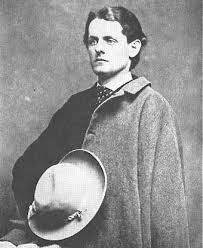Today, we begin another reoccurring series that will give readers a brief glimpse into the lives of certain personalities throughout history. Our person of interest this afternoon is Henry Kyd Douglas, a young staff officer who served with “Stonewall” Jackson and later penned a well-known memoir regarding his wartime experiences.
Born in Shepherdstown, Virginia on 29 September 1838, Douglas spent his youth living on both sides of the Potomac, most notably with his father at “Ferry Hill”. As war clouds loomed during the mid-19th century, Douglas made it clear that he had no feeling of resentment against northerners, and believed that slavery was a curse to the Middle States. After the election of Abraham Lincoln in November 1860, Douglas traveled to St. Louis to practice law. “I did not believe our people would ever take up arms against each other,” Douglas assured himself, “I could not make myself believe that there could be a dissolution of the Union … I was so much opposed to it.”
Hearing of Virginia’s Ordinance of Secession passed on 17 April 1861, he returned home to fulfill his new-found duty to defend his native state. A week after his arrival he enlisted in Company B, Second Virginia Infantry with other men from Shepherdstown, and traveled to Harper’s Ferry. It was here that Thomas Jackson took on the task of training and drilling this newly formed Confederate Army.
In June 1861, with General Robert Patterson’s army — the Department of Pennsylvania — threatening to cross the Potomac, Joseph E. Johnston ordered Douglas and Company B to return to Shepherdstown and sever any crossing points along the river. A toll bridge below Ferry Hill was set ablaze by the men and Douglas stared across the river to his boyhood home as the flames flickered off the glass windows. Remembering that his father had owned stock in the bridge, it was at this point he understood that the war had officially begun and he was now cut off from his home and family.
Serving with great distinction and gallantry, Douglas distinguished himself on the battlefield and rose through the ranks, eventually being placed on Stonewall Jackson’s staff in June 1862. During the Maryland Campaign, Jackson’s force bivouacked at Martinsburg before advancing to besiege Harper’s Ferry. The young staff officer used his familiarity with the area to a great extent during the campaign, which helped Jackson tremendously. After the Battle of Shepherdstown (September 19-20), Jackson’s Corps returned to Martinsburg and Douglas was ordered to oversee the dismemberment of the Baltimore and Ohio Railroad, which kept him very busy.
In October 1862, as a result of the poor relationship between Douglas and Jackson, he was made Captain of Company C, 2nd Virginia Infantry, and later appointed Inspector General of the “Stonewall” Brigade. He served now beside the brigade’s commanding officer, Elisha F. Paxton. At Chancellorsville, on the night of May 2, 1863, he and Paxton conversed about the action that would take place the following day. Douglas remembered after the war that during this conversation, Paxton spoke of not surviving the battle. “He did not seem morbid or superstitious but he spoke with earnest conviction,” remembered Douglas. Sure enough, the next day Paxton was killed at the head of the brigade.
After Jackson’s death on May 10, 1863, Henry Kyd Douglas began jumping from staff to staff of different generals. Promoted to Major as part of General Edward Johnson’s staff, at Gettysburg on July 2, Douglas was wounded and captured, spending eight months at Johnson’s Island prison. Finally ending up with Jubal Early in 1864, during the Shenandoah Valley Campaign, he found himself again in Martinsburg where the B&O Railroad was again ordered to be destroyed. Promoted to Lieutenant Colonel, Douglas commanded a brigade at Appomattox and was present for Lee’s surrender.
When the war finally came to an end during the spring of 1865, he returned home and was held as a witness at the trial of Lincoln’s conspirators, having known some of them personally. He moved to Hagerstown, Maryland and practiced law, becoming extremely active in veteran’s affairs. During the 1870’s, Douglas led the effort to have Confederate dead still buried on the Antietam battlefield to be reinterred in Hagerstown, which succeeded. However, he was not successful later when running for office in the Maryland Senate and United States Congress. As he grew older, the veteran penned his famous memoir, I Rode With Stonewall, which unfortunately is filled with exaggerated stories about his war experiences and is considered a somewhat unreliable source. Henry Kyd Douglas died on 18 December 1903 and is buried in Elmwood Cemetery, Shepherdstown, West Virginia.

